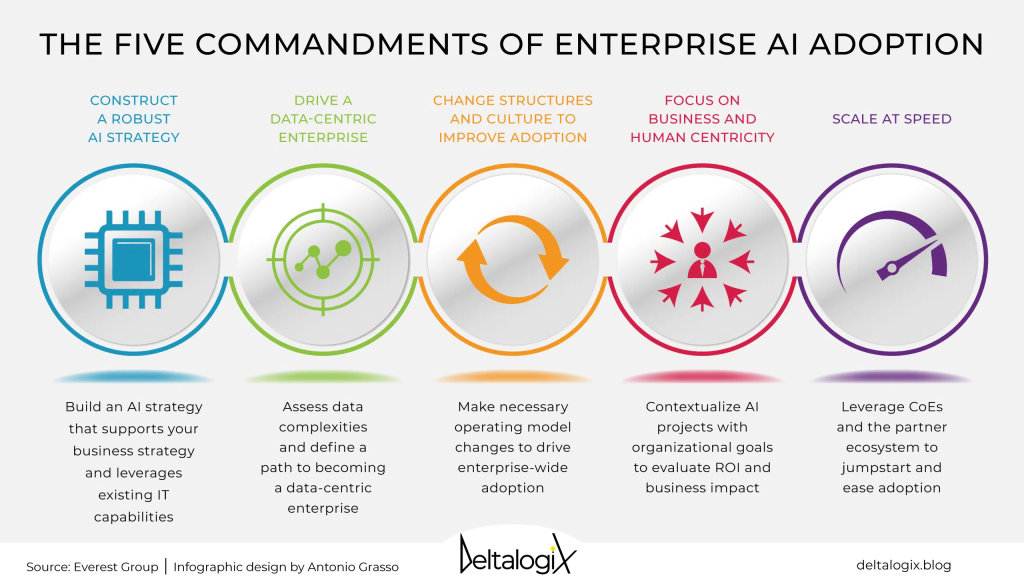AI adoption is rapidly transforming the landscape of modern business, but many organizations face significant hurdles in implementing this technology effectively. Despite a growing recognition of its potential, IT leaders express concern over necessary factors such as AI security, data governance, and a cohesive AI strategy. According to recent CIO insights, a substantial 57% of professionals consider AI adoption a top priority, yet they encounter challenges in aligning technology and security objectives. Generative AI is leading the charge, with 32% of organizations already utilizing it and many more planning to do so shortly. It is evident that without addressing these security and governance challenges, the full potential of AI will remain largely untapped.
The embrace of artificial intelligence is reshaping organizational dynamics, compelling leaders to explore innovative capabilities that underpin business strategies. This technological revolution emphasizes the importance of secure and well-governed data as a foundation for successful implementation. In this context, CIOs are prioritizing their approach to integrating intelligent systems, with the aim of enhancing operational efficiency and decision-making. As these organizations navigate the complexities of AI methodologies—such as generative AI—they’re faced with the need for robust frameworks to mitigate potential risks. In pursuit of effective data stewardship and increased automation, leaders are taking significant steps to refine their AI strategies.
The Challenges of AI Adoption in the IT Sector
Despite the clear benefits of AI, many IT leaders express concerns over the challenges associated with its adoption. A significant portion of organizations struggle with implementing effective security frameworks that are compatible with AI technologies. According to a recent study, over 50% of CIOs report finding it extremely difficult to navigate the complexities of AI security and legal compliance, ultimately stalling their efforts towards adopting AI solutions. This hesitance can stem from a lack of clear strategies regarding AI deployment, as well as insufficient governance structures that can adequately manage the inherent risks of AI applications.
Furthermore, the alignment between IT objectives and AI strategy is a key area of concern. Only 47% of IT leaders believe that their organization’s security goals are in sync with their AI strategies. This misalignment can lead to critical oversights, especially as Generative AI technologies gain traction. Without a dedicated AI strategy that incorporates robust data governance, organizations may find themselves vulnerable to breaches and other security threats that arise from unchecked AI processes.
AI Adoption: Opportunities and Readiness in Business Applications
As organizations focus on integrating AI into their operations, the opportunities for enhancing employee productivity and streamlining business processes become clear. With 32% of businesses already harnessing Generative AI and another 26% planning to do so shortly, it’s evident that the momentum for AI adoption is growing. A majority of organizations acknowledge the potential ROI from AI initiatives, highlighting its advantages in areas like security operations and software development. However, this optimism must be counterbalanced by a proactive approach to managing data security and governance.
To maximize the benefits of AI, organizations must invest in training and development for their personnel and embrace the integration of AI strategic roles, such as Chief AI Officers. These leaders can ensure the alignment of technical goals with broader business objectives, thereby fostering a cohesive approach to AI utilization. The move towards better governance will not only facilitate the confidence of stakeholders in AI’s capabilities but also strengthen the overall security posture of organizations.
The Importance of Data Governance for Successful AI Implementation
A cornerstone of AI implementation is effective data governance. This aspect is particularly critical in light of the heightened risks associated with AI applications, where unstructured data can complicate security efforts. Approximately 46% of IT leaders are currently developing data security programs to combat these threats, yet a notable portion remains unsure of their effectiveness. Enhancing data governance practices is essential for mitigating these risks and ensuring that AI initiatives can be executed safely and successfully.
Research indicates that a strong governance framework not only helps to safeguard sensitive information but also aids organizations in measuring the ROI of their AI investments. As IT leaders recognize the significance of data-driven decision-making, the need for sound governance practices becomes increasingly pertinent. A structured approach to data management will empower organizations to take full advantage of AI capabilities while reducing security vulnerabilities that may arise when data is inadequately protected.
Generative AI: Current Trends and Future Implications
Generative AI is at the forefront of innovation, offering promising avenues for efficiency across various sectors. With the current adoption rates showing that 32% of organizations have implemented Generative AI, and many more planning to do so, this technology is set to transform standard operational practices. Applications of Generative AI can be seen in security operations, employee productivity, and software development, marking a significant shift in how organizations are leveraging advanced technologies for competitive advantage.
However, despite its proliferating presence, organizations must carefully navigate the challenges that accompany Generative AI adoption, namely data security threats and the complexities of compliance issues. The technology’s ability to generate outputs based on massive datasets necessitates strict governance to ensure adherence to legal standards and internal policies. Companies must prioritize establishing effective AI strategies that align with existing security frameworks to harness Generative AI’s potential while mitigating associated risks.
CIO Insights: Navigating the Future of AI and Security Governance
CIOs are increasingly seen as pivotal figures in the successful implementation of AI strategies within their organizations. Their unique position allows them to bridge the gap between IT security and operational needs, ensuring that AI technologies are not only adopted but are also secure and compliant with governance standards. Insights from CIOs reveal a prevailing sentiment that although AI is vital for business success moving forward, significant barriers remain in terms of readiness and preparedness for its deployment.
As such, the role of CIOs is evolving, requiring them to not only oversee IT operations but also to advocate for better alignment between security imperatives and data governance in the context of AI. By understanding the challenges and potential of AI security, CIOs can lead the charge in establishing robust frameworks that secure AI initiatives, ultimately fostering trust among stakeholders and ensuring a stable path towards comprehensive AI adoption in their organizations.
Building a Secure Foundation: Best Practices for AI Governance
Establishing a solid foundation for AI governance is essential for organizations seeking to leverage the transformative power of artificial intelligence without compromising their security posture. Best practices for AI governance include creating robust data management frameworks, implementing strict access controls, and developing clear policies for data use that align with broader organizational standards. Organizations should also invest in ongoing training and upskilling of all employees to foster a culture of security mindfulness when it comes to AI applications.
Moreover, fostering cross-departmental collaboration is crucial as it allows for diverse perspectives within AI strategy and implementation processes. Engaging various stakeholders, from IT and security personnel to business leaders, ensures that an organization’s governance framework is comprehensive and responsive to potential risks. By embracing these best practices, organizations can mitigate the complexities that arise from data risks while confidently moving forward with AI strategies.
Future Projections: AI Strategy and Its Impact on Security and Governance
Looking ahead, the intersection of AI strategy, security, and governance is likely to become more pronounced as organizations grapple with rapidly evolving technologies. As AI continues to integrate itself into core business functions, the importance of strong governance frameworks will remain front and center. Forward-thinking organizations are acknowledging that the future of a successful AI strategy hinges not just on technological adoption but on the robust governance that surrounds it.
Anticipating future challenges, IT leaders must remain adaptable, leveraging insights from industry studies to refine their AI strategies continuously. This proactive approach includes addressing security risks head-on by developing innovative solutions that keep security standards at the top of their agenda. With careful planning and execution, organizations can navigate the complexities of AI deployment while capitalizing on the transformative potential that AI technologies bring to their business landscape.
Frequently Asked Questions
What is AI adoption and why is it important for businesses?
AI adoption refers to the integration of artificial intelligence technologies into business processes to enhance efficiency, drive innovation, and improve decision-making. As organizations face increasing competition, adopting AI can provide a significant edge by automating tasks, analyzing data swiftly, and streamlining operations.
How does AI security impact AI adoption in organizations?
AI security is critical for AI adoption, as businesses must mitigate security and legal risks associated with AI technologies. A study revealed that 53 percent of IT leaders find it challenging to address these risks, which can hinder the implementation of AI strategies. Ensuring robust AI security measures helps build trust and confidence in AI solutions.
What role does data governance play in AI adoption?
Data governance is essential for successful AI adoption, serving as the frontline defense against data security risks. Organizations must establish solid governance frameworks to ensure data integrity, compliance, and security, which enables AI systems to operate effectively and deliver reliable insights.
What are CIO insights regarding the importance of AI strategy in business?
CIO insights indicate that AI strategy is a priority for many organizations, with 57 percent of leaders highlighting AI adoption as a top focus. However, aligning IT and security objectives with AI strategies is crucial to maximize ROI and ensure effective AI deployment across the organization.
What is generative AI and how is it influencing AI adoption trends?
Generative AI (GenAI) is transforming AI adoption by enabling organizations to create new content or solutions from existing data. With 32 percent of businesses already adopting GenAI, key use cases in security operations, employee productivity, and software development demonstrate its potential to drive significant value in various sectors.
What challenges do organizations face in adopting agentic AI?
Despite its growing importance, only 19 percent of companies have adopted agentic AI, primarily due to concerns about complexity and alignment with business objectives. Many organizations recognize the need for clearer strategies and governance frameworks to confidently integrate agentic AI into their operations.
How can organizations measure ROI from their AI adoption initiatives?
Measuring ROI from AI adoption requires clear metrics and robust data governance practices. Although 54 percent of CIOs are confident in proving ROI, only 43 percent express high confidence in measuring their information assets’ security and management, indicating a need for improved metrics and practices in this area.
What measures should organizations take to ensure successful AI adoption?
To ensure successful AI adoption, organizations should prioritize AI security, strengthen data governance frameworks, align IT and security objectives with AI strategies, and simplify data complexities. By addressing these factors, businesses can enhance their readiness for responsible AI deployment.
What findings did the Ponemon Institute for OpenText reveal about AI adoption?
The Ponemon Institute’s study highlighted that while 57 percent of IT leaders view AI adoption as a priority, many struggle with security and governance issues. Key findings included that 50 percent of organizations are hiring leadership roles to oversee AI strategy, illustrating a commitment to enhancing their AI capabilities despite current challenges.
How is simplifying information complexity linked to AI adoption and security?
Simplifying information complexity is crucial for successful AI adoption and robust security. The study found that 73 percent of respondents consider reducing complexity vital for maintaining a strong security posture, as unstructured data contributes significantly to security risks, making effective data governance necessary for AI success.
| Key Points |
|---|
| IT leaders’ optimism about AI potential is high, but readiness is low. |
| 57% of CIOs and CISOs consider AI adoption a priority. |
| 54% are confident in proving ROI from AI initiatives. |
| 53% face difficulties in mitigating AI security and legal risks. |
| Only 47% report alignment between IT/security objectives and AI strategies. |
| 50% plan to hire a chief AI officer or digital officer for AI oversight. |
| 32% have adopted Generative AI; 26% plan to adopt soon. |
| Key GenAI use cases: security operations (39%), employee productivity (36%), software development (34%). |
| 19% have adopted agentic AI; only 31% see it as highly important. |
| 73% believe reducing complexity is essential for security posture. |
| 46% are developing data security programs; 43% are confident in measuring ROI from security measures. |
Summary
AI adoption is crucial for the future of organizations seeking to maintain a competitive edge. Despite the enthusiasm of IT leaders for AI technologies, significant gaps in readiness and risk mitigation capabilities remain. For successful AI integration, companies must prioritize establishing robust security frameworks and ensuring governance aligns with their AI strategies. Without addressing these challenges, organizations may struggle to realize the full promise of AI, especially as complexities in data management continue to escalate.




